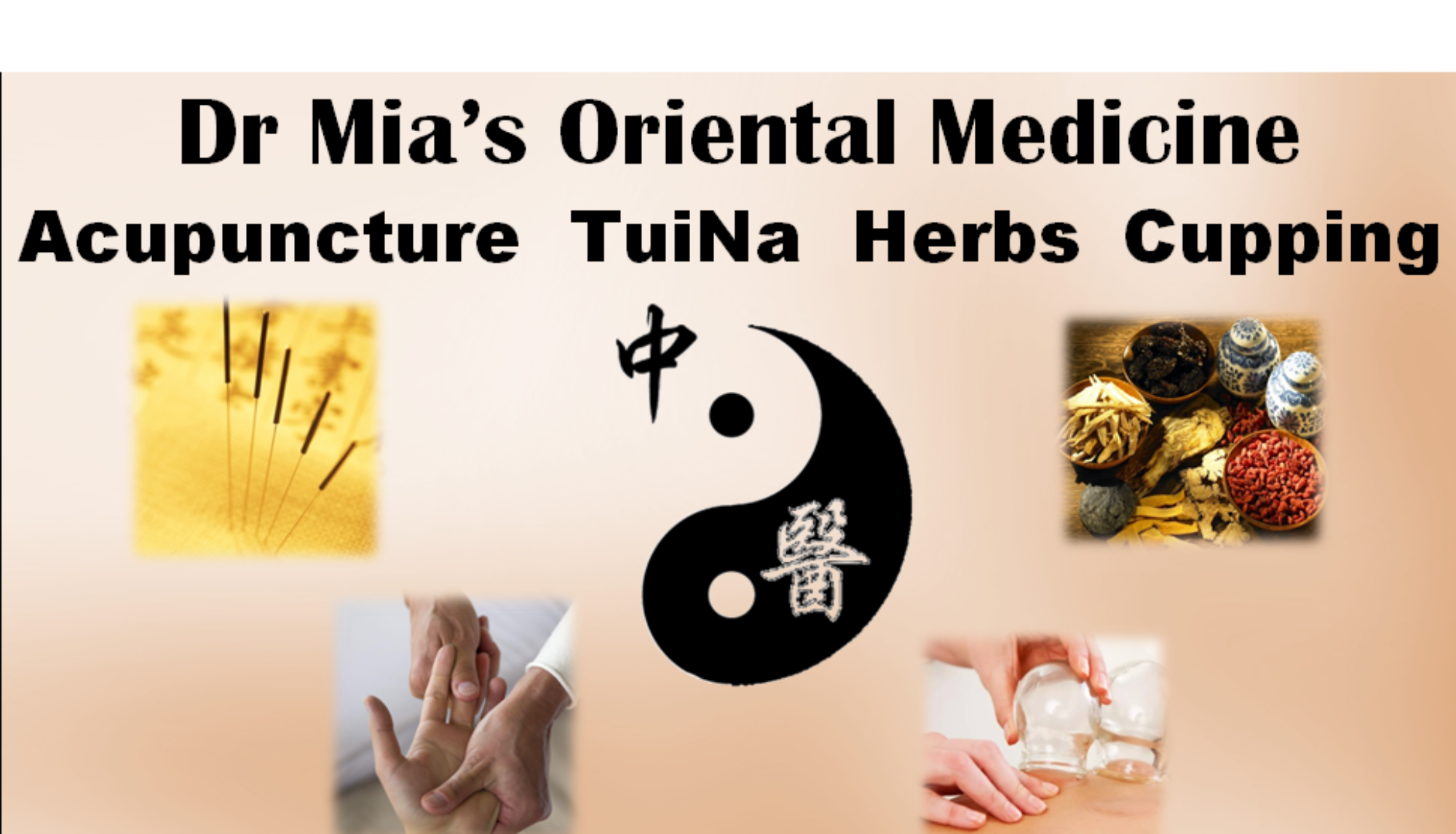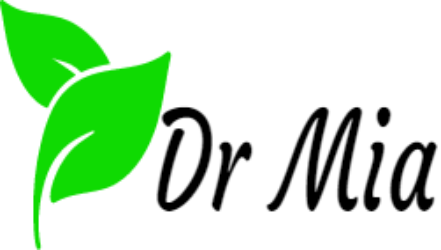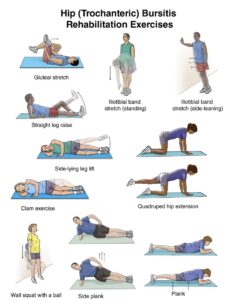
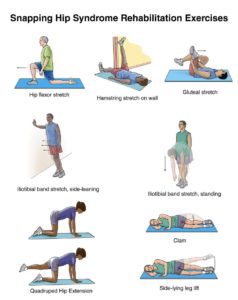
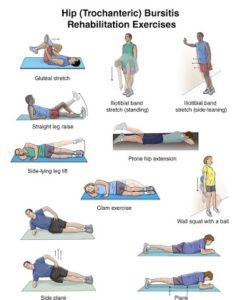
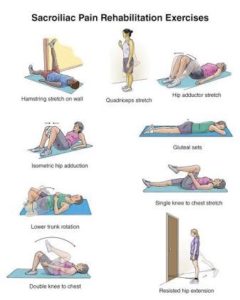
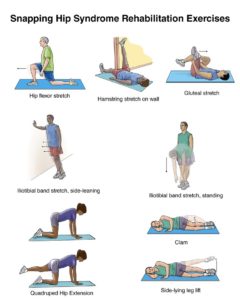
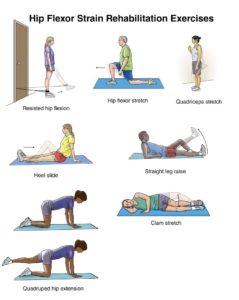
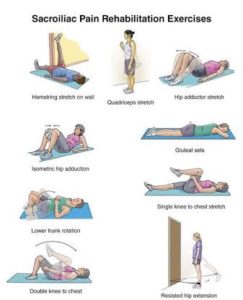
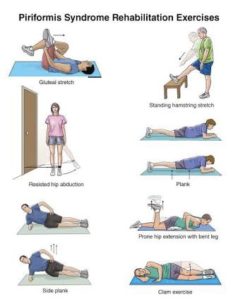
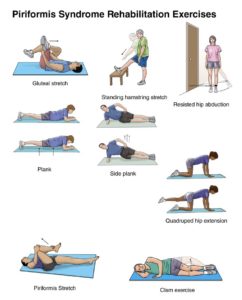
Common Causes and Conditions of Hip Pain
1. Joint & Degenerative Conditions
- Osteoarthritis – Cartilage wear, stiffness after rest
- Femoroacetabular Impingement (FAI) – Abnormal bone growth causing pinching
- Avascular Necrosis – Bone death from poor blood supply
2. Soft Tissue & Tendon Issues
- Trochanteric Bursitis – Outer hip pain when lying on side
- Hip Labral Tear – Clicking/catching sensation
- Psoas Tendinitis – Groin pain when lifting knee
3. Nerve-Related Pain
- Sciatica – Referred pain from lumbar spine
- Meralgia Paresthetica – Numbness over thigh (lateral femoral nerve compression)
- Piriformis Syndrome – Deep buttock pain radiating down leg
4. Systemic & Referred Pain
- Rheumatoid Arthritis – Symmetrical joint swelling
- Hip Fractures – High-risk in osteoporosis
- Referred Pain – From SI joint, kidneys, or lumbar spine
Rehab Exercises at Home After and Between TCM Treatments
1. Mobility & Stretching Exercises
A. 90/90 Hip Stretch
- Sit with one leg bent 90° in front, other bent 90° to side
- Lean forward over front leg
- Hold: 30 sec/side
- Benefits: Improves internal/external rotation
B. Pigeon Pose (Modified)
- From tabletop, bring one knee toward wrist, extend other leg back
- Keep hips square
- Hold: 30-60 sec/side
- Benefits: Releases piriformis and glutes
C. Standing Hip CARs (Controlled Articular Rotations)
- Balance on one leg, slowly draw circles with other knee
- Reps: 5 circles each direction
- Benefits: Maintains joint capsule mobility
2. Strengthening Exercises
A. Clamshells with Band
- Side-lying, knees bent, resistance band above knees
- Lift top knee while keeping feet together
- Reps: 15-20/side
- Benefits: Targets gluteus medius
B. Single-Leg Bridge
- Feet flat, lift hips, extend one leg straight
- Reps: 8-10/side
- Benefits: Activates hamstrings and glutes
C. Lateral Band Walks
- Mini-band around ankles, slight squat, step sideways
- Steps: 10 each direction
- Benefits: Builds abductor strength
3. TCM-Inspired Therapies
A. Moxibustion on GB-30 (Huantiao)
- Locate midpoint between greater trochanter and sacrum
- Duration: 10-15 minutes
- Benefits: Relieves sciatic pain, warms channels
B. Cupping Along Gallbladder Meridian
- Apply cups along outer thigh (GB-31 to GB-34)
- Method: 5-10 minutes sliding cups
- Benefits: Releases muscle adhesions
C. Herbal Compress
- Steamed pouch with Safflower (Honghua) + Myrrh (Moyao)
- Application: 20 minutes on painful area
- Benefits: Reduces inflammation and stasis
TCM Pattern-Specific Modifications
1. Cold-Damp Obstruction
- Signs: Worse in humidity, stiffness improves with movement
- Add:
- Ginger Foot Soaks before bed
- Moxa on SP-9 (Yinlingquan) + ST-36 (Zusanli)
2. Blood Stasis
- Signs: Stabbing pain, visible varicose veins
- Add:
- Pricking Cupping at BL-54 (Zhibian)
- Turmeric + Hawthorn Tea daily
3. Kidney Deficiency
- Signs: Weakness, fatigue, chronic instability
- Add:
- Walnut + Black Sesame Paste as snack
- Acupressure on KI-3 (Taixi) 2x/day
Precautions & Recommendations
✔ Sleep with pillow between knees for side sleepers
✔ Use cane on opposite side if limping
✖ Avoid:
- Cross-legged sitting (aggravates FAI)
- Deep squats during acute bursitis
When to Seek Help:
- Inability to bear weight
- Groin pain with fever (possible infection)
- Sudden worsening in RA patients
Note: These exercises complement acupuncture targeting GB-29 (Juliao) and GB-34 (Yanglingquan). For labral tears or advanced OA, consult an orthopedic specialist.
Here’s the comprehensive guide you requested, integrating TCM principles with modern rehabilitation for specialized hip conditions:
1. Pre/Post-Hip Replacement TCM Protocols
Pre-Op (4-6 Weeks Before)
▸ TCM Preparation:
- Electroacupuncture at GB-30/GB-34 twice weekly to improve local circulation
- Modified Liu Zi Jue Qi Gong focusing on “Xu” (expelling) breath to clear stagnation
- Herbal Formula: Modified Tao Hong Si Wu Tang with added Ji Xue Teng (30% reduced dosage 1 week pre-op)
Post-Op Phase Guide:
| Phase | Timeframe | TCM Interventions | Key Exercises |
|---|---|---|---|
| Acute | Days 1-7 | Moxa on ST-36 (indirect, 5cm away) Ear seeds at Shenmen & Hip points | Ankle pumps Diaphragmatic breathing |
| Subacute | Weeks 2-4 | Aqua-acupuncture with Vitamin B12 at GB-31 Magnetic pearl patches on BL-54 | Seated marching Quad sets with channel awareness |
| Integration | Months 2-3 | Moxa on surgical scars (after complete healing) Cupping along Bladder meridian (no suction on incision) | Water walking Tai Chi Cloud Hands adaptation |
Critical Contraindications:
- No gua sha on operated leg for 8 weeks
- Avoid moxa directly over metal implants
- Delay blood-moving herbs (like San Qi) until 72 hours post-op
2. Pediatric Hip Dysplasia (Developmental) Care
TCM Constitutional Approach:
- Liver/Kidney Tonification Protocol:
- Pediatric tuina: Gentle kneading of GB-20 and BL-23 (3 minutes each)
- Mild moxa on KD-27 (1 minute per side)
- Herbal Bath:
- Du Zhong 15g + Xu Duan 10g boiled, added to bath
- Water temperature ≤38°C, 10-minute soak
Pavlik Harness-Friendly Exercises:
- Meridian Tracing Play
- Use non-toxic paint to trace Gallbladder meridian on baby’s leg
- Parents gently stroke along line during diaper changes
- Hip Circles with Sound Therapy
- Hold flexed hips, make slow circles while playing Gong notes
- Frequency: 3x/day, 5 circles each direction
- Swaddling Modification
- Leave hips flexed/abducted using TCM-style cloth wrap
- Insert Eucommia bark-infused padding
Monitoring Signs:
- Check for heat asymmetry at SP-10 area daily
- Observe tongue coating changes (thick white indicates need for adjustment)
3. Martial Arts Hip Openers (TCM Meridian Focus)
Shaolin-Inspired Sequence:
- Golden Rooster Stands on One Leg (Modified)
- Hold stance while visualizing Qi flowing GB→ST meridians
- Add finger pressure on GB-41 during balance
- Dragon Stretches Its Waist
- Deep lunge with opposite-side arm reaching through
- Coordinate with “Xu” exhalation
- Focus on opening Dai Mai (Belt Channel)
- Monkey Picks Fruit
- Deep squat with internal rotation emphasis
- Activate Huiyin (CV-1) during ascent
TCM Meridian Activation Tips:
- Perform at Chen time (7-9am) for Gallbladder meridian benefits
- Apply Dit Da Jow before training to prevent stagnation
- Follow with Bone Marrow Washing breathing (reverse abdominal)
Contraindications:
- Avoid full splits (Cha Ma) with:
- Pulse showing Slippery quality (Damp accumulation)
- Tongue with lateral teeth marks (Spleen Qi deficiency)
Integration Protocol Table
| Timeframe | TCM Modality | Martial Arts Application | Nutritional Support |
|---|---|---|---|
| Pre-Training | Gua sha along GB meridian | Dynamic hip circles | Goji berry infusion |
| Mid-Session | Acupressure on BL-54 | Stance transitions | Bamboo salt water |
| Recovery | Moxa on CV-4 | Meditation in horse stance | Black sesame paste |
Advanced Technique:
For Iron Shirt practitioners, combine:
- 30% reduced range motions
- Zi Wu (midnight/noon) timing
- Ming Men fire visualization
